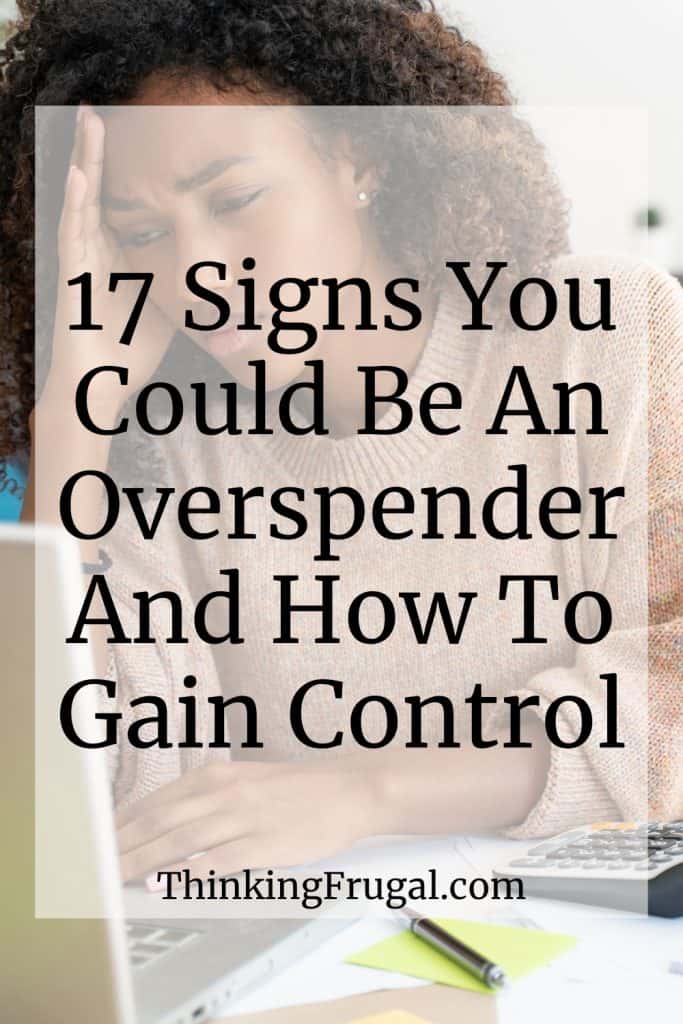17 Signs You Could Be an Overspender and How to Gain Control
I make money on some of the products and services I mention on Thinking Frugal through affiliate relationships. I never endorse a product or service unless I believe it will benefit my readers.
In a world where consumerism is constantly shoved in our faces, it can be easy to fall into the trap of overspending. Whether it’s treating yourself to that designer bag you’ve had your eye on or constantly dining out with friends, the cost of these indulgences can add up quickly.
If you find yourself constantly swiping your credit card, indulging in impulse purchases, and struggling to make ends meet each month, you might be exhibiting the telltale signs of an overspender.
Overspending can be a sneaky and detrimental habit that creeps into our lives, wreaking havoc on our financial stability. But fear not because recognizing the signs is the first step towards regaining control of your finances.
Let’s take a look at 17 common signs that indicate you might be an overspender and, more importantly, the practical advice on how to rein in your spending habits and steer your financial ship back on course.
Make an Extra $100+ Per Month for Free:
Earnably: Earn gift cards or PayPal cash to watch videos, complete surveys, and more.
GrabPoints: Earn money watching videos, completing surveys, downloading apps, and more.
Ibotta: Get paid to shop.
InboxDollars: Get paid to watch videos, shop, complete surveys, and more.
InstaGC: Earn gift cards, or PayPal cash by watching videos, taking surveys, shopping, and more.
Swagbucks: Earn gift cards, or PayPal cash by watching videos, taking surveys, shopping, and more.

How to Tell if You’re an Overspender
1) You Don’t Have a Budget
Not having a budget clearly indicates potential overspending because it reflects a lack of financial discipline and awareness.
Without a budget, you’re unsure where your money goes each month, and it’s easy to overspend.
Overspending can lead to accumulating debt, living paycheck to paycheck, and difficulty achieving financial goals because you lack a structured plan to allocate your resources effectively.
Overspenders typically prioritize short-term desires over long-term financial stability, and the absence of a budget can enable this behavior, making it a significant red flag for financial imprudence.
Creating a budget allows you to see where your money is going and make necessary adjustments to ensure you live within your means.
2) Your Bills Are Always Paid Late
If you find yourself constantly scrambling to pay bills at the last minute or, even worse, missing due dates altogether, you may be an overspender.
When we overspend, our resources are stretched thin, making it difficult to keep up with important financial responsibilities, leading to late fees, interest charges, and a damaged credit score.
Prioritize your bills and set reminders for due dates to avoid this common overspending trap. You can also set your bills up on autopay to ensure they’re never late.
3) You Buy Things You Don’t Use
Have you ever bought something on a whim, only to realize later that you have no use for it? Overspenders are notorious for buying items they don’t actually need or use.
To combat this, try practicing mindfulness when making purchases and ask yourself if the item is truly necessary before buying it.
Consider waiting a day or two before making impulsive purchases to see if you still really want or need the item.
4) You Use Shopping as a Coping Mechanism
Overspending can often be linked to emotional spending by shopping to cope with stress, boredom, or other emotions.
While retail therapy may provide temporary relief, it can quickly get out of control and lead to overspending.
Instead of relying on shopping to make you feel better, find healthier ways to cope with your emotions, like exercise, meditation, or talking to a friend.
5) You Hide Purchases
If you find yourself hiding purchases from your partner, family members, or friends, it could be a sign that you’re overspending.
Overspenders often feel guilty or ashamed about their spending habits and try to hide them from others, and this can lead to strained relationships and further financial stress.
It’s important to be open and honest about your spending with loved ones and work together to find a solution.
6) You Go on Frequent Shopping Sprees
Overspenders often have a compulsive need to shop and may go on frequent shopping sprees.
These shopping sprees can be dangerous for your finances because they can quickly drain your bank account and leave you with little to no savings.
To avoid falling into this trap, try setting limits for yourself on how often you go shopping or only allowing yourself to buy one item per outing.
7) You Don’t Prioritize Saving
Overspenders often have a “live for today” mentality and struggle with prioritizing saving for the future. Doing this can lead to financial instability and stress when unexpected expenses arise or you reach retirement age without enough savings.
Instead, make it a habit to put aside part of your monthly income into a savings account or investment portfolio.
8) You Frequently Overdraw Your Bank Accounts
If you find yourself constantly overdrawing your bank accounts or relying on credit cards to cover expenses, it’s a clear sign that you may be overspending.
It’s important to regularly check your bank account balances and stick to your budget to avoid overspending.
9) Your Credit Score is Bad
Overspending can have a major impact on your credit score because missed payments and high credit card balances can lower your score significantly.
An unfavorable credit score will make it hard for you to get approved for new loans or credit cards in the future or result in higher interest rates.
If you notice that your credit score is suffering due to overspending, make it a priority to pay off debts and start making payments on time to improve your score.
10) You Should Have Plenty of Money
Do you have a good income but still find yourself struggling to keep up with expenses? Overspenders often make more than enough money to cover their bills but struggle with managing their spending habits.
To break this cycle, taking control of your spending and prioritizing saving for the future is essential.
11) Your Debt is More Than Your Income
Overspending can quickly lead to debt, especially when it comes in the form of credit card balances with high interest rates.
If you find that your debt is more than your income, it’s a clear indicator that you need to reevaluate your spending habits and make changes to get out of debt. Start by creating a budget and cutting back on unnecessary expenses.
12) You’ve Maxed Out Your Credit Limits
Maxing out your credit cards is a major red flag for overspenders. It not only puts you at risk for high interest charges and debt but also shows that you are relying too heavily on credit to cover expenses.
To avoid maxing out your credit limits, you should use cash or debit cards when making purchases. And if you do use credit, make sure to pay off the balance in full each month to avoid accumulating debt.
13) You Have No Emergency Savings
Life is unpredictable, and emergencies can and will happen at any time.
If you have no emergency savings, you can find yourself relying on your credit cards or taking out new loans to cover unexpected expenses, and this not only adds to your debt but also makes it difficult to get ahead financially.
It’s important to have an emergency savings account that can cover at least three to six months’ worth of expenses in case of job loss, unexpected medical bills, or other emergencies.
14) You Have No Retirement Savings
Similar to emergency savings, many overspenders struggle with saving for retirement.
It may seem far off, but starting early and consistently putting away money for your golden years can make a massive difference in the long run.
If you find yourself constantly dipping into your retirement savings or not contributing at all, it’s time to reevaluate your spending habits and make room for this important financial goal.
15) You Pay Minimum Credit Card Payments
Credit cards can be convenient and offer rewards but can also be a slippery slope for overspenders.
Paying just the minimum balance each month means you are not paying off your debt in full and will continue to accrue interest. A balance with accruing interest is how many people end up with large amounts of credit card debt that they struggle to pay off.
Pay more than your minimum monthly payment, or consider consolidating your credit card debt to a lower-interest loan.
16) You Frequently Borrow Money
Whether it’s from family, friends, or even payday lenders, frequently borrowing money is a red flag for overspending.
Constant borrowing can also lead to strained relationships and financial instability.
Instead of relying on others for temporary relief, focus on creating a budget and cutting back on unnecessary spending.
17) You Lack Financial Goals
Overspenders typically have trouble setting and sticking to financial goals because their spending is based on immediate gratification rather than long-term planning.
Consider your financial goals, whether saving for a down payment on a house or paying off student loans, and create a plan to achieve them. Doing this will help you prioritize your spending and avoid overspending on unnecessary purchases.
Final Thoughts
Overspending can lead to financial stress and anxiety, but recognizing the signs and taking action can help you gain control of your finances.
Remember to prioritize your financial goals and needs and find different ways to enjoy life without breaking the bank.
By making minor changes to your spending habits and sticking to a budget, you can take steps toward financial stability and peace of mind.







